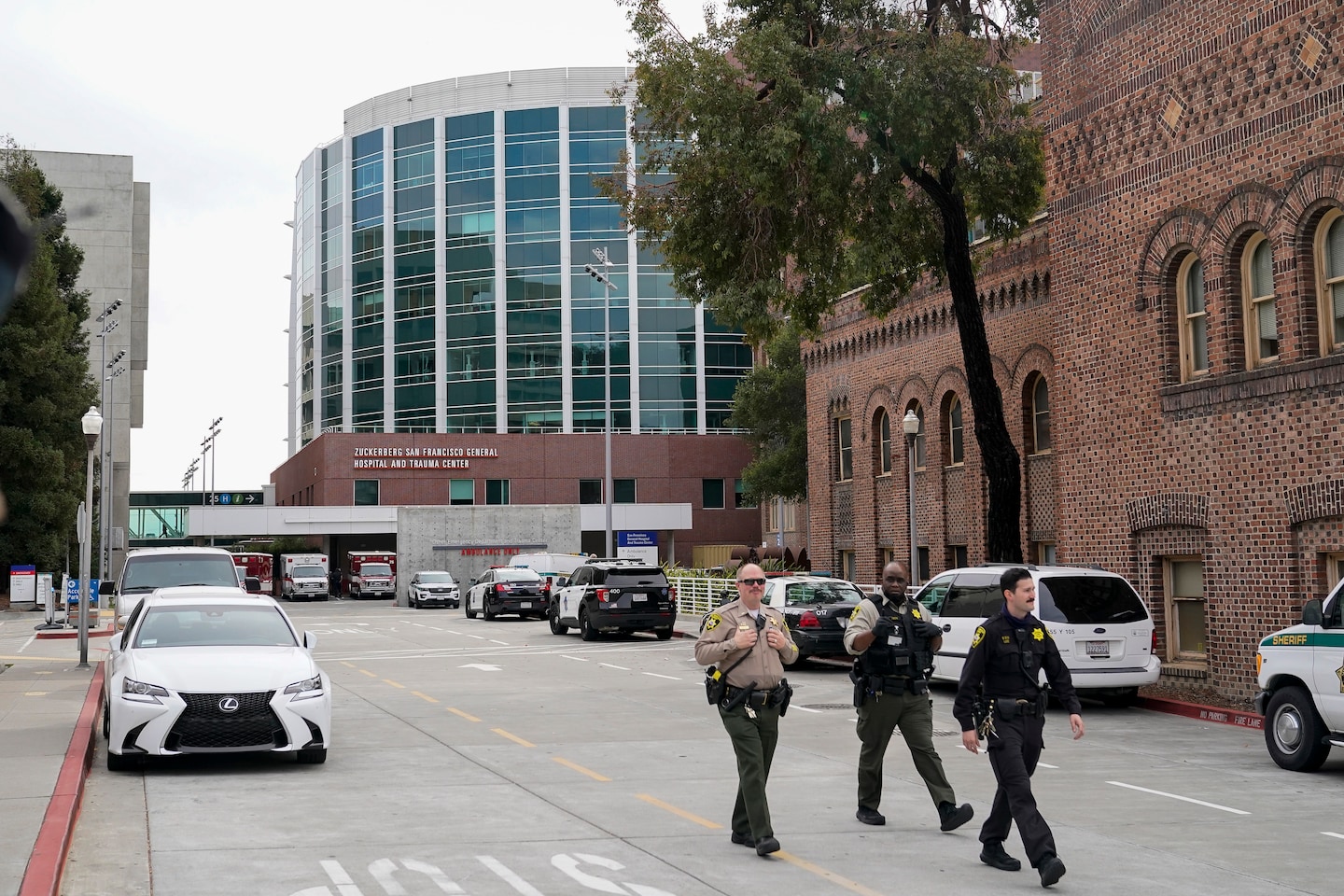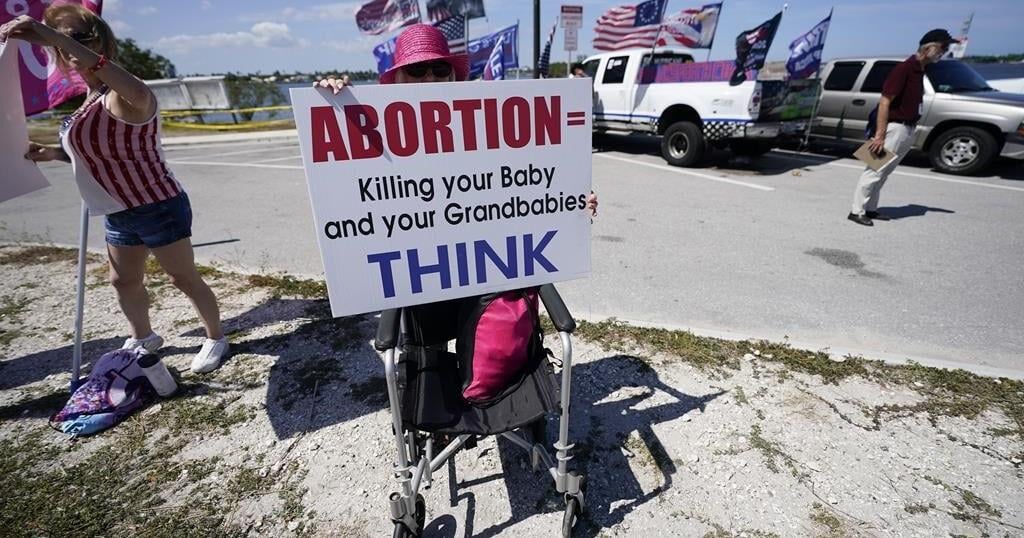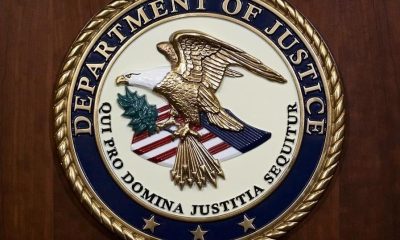The brazen attack on Paul Pelosi, husband of House Speaker Nancy Pelosi, is renewing concerns about the toxic political atmosphere and is prompting calls to beef up security for lawmakers and their family members.
Politics
Paul Pelosi recovering as attack renews focus on toxic politics

Paul Pelosi, 82, was recovering in Zuckerberg San Francisco General Hospital on Saturday following surgery for a fractured skull and other injuries from an attack early Friday by a hammer-wielding intruder.
Nancy Pelosi made her first public comments about the matter on Saturday night in a Dear Colleague letter to members of Congress, referring to how “a violent man broke into our family home, demanded to confront me and brutally attacked my husband Paul.”
She thanked supporters, saying that “the outpouring of prayers and warm wishes from so many in the Congress is a comfort to our family and is helping Paul make progress with his recovery.” The letter didn’t make any political attacks but quoted a Bible verse from Isaiah 41:10 that begins “Do not fear, for I am with you. Do not be dismayed, for I am your God.”
San Francisco police have identified the suspect in the attack as David DePape, 42, who appears to have been deeply drawn into election falsehoods, political conspiracy theories like QAnon and fringe rantings from various right-wing sites.
The Washington Post confirmed that a voluminous blog written under DePape’s name was filled with deeply antisemitic writings and baseless claims as well as pro-Donald Trump and anti-Democratic posts. It was registered to a house in Richmond, Calif., where DePape lives, according to neighbors.
“We are on a very slippery slope and I think the whole issue of security needs a fresh examination,” said Rep. Anna G. Eshoo (D-Calif.), who represents a San Francisco Bay area district close to Pelosi’s and is the speaker’s closest friend in Congress.
“This has to stop,” Eshoo said, referring to the propagation of inaccurate conspiracy theories that appear to be fueling fury toward lawmakers. She said her constituents “are surprised that we stand in line, go through security — they think every one of us has security.”
Rep. Diana DeGette, a Democrat from Colorado, said the attack spotlights the dearth of safeguards for family members of lawmakers who may be targets.
“Here was Paul Pelosi, all by himself at home,” she said in an interview.
DeGette said she had a security detail when she was one of eight House members who managed the second impeachment of former president Donald Trump. But her husband did not have protection when she was in Washington and he was in Colorado, she said.
The U.S. Capitol Police, the agency responsible for protecting members of Congress, has reported a sharp increase in threats against lawmakers in recent years, and threats have sharply escalated since the Jan. 6, 2021, attack on the Capitol. It said the number of cases involving threats against members of Congress rose from about 4,000 in 2017 to more than 9,600 last year.
The rising use of campaign ads invoking hunting imagery and other heated rhetoric against opponents has candidates imposing more stringent security this election season.
While she unsuccessfully defended her seat in the primaries this year in Wyoming, Rep. Liz Cheney (R) simply could not hold the sort of traditional campaign events meant to demonstrate broad support.
Cheney, the daughter of former vice president Dick Cheney, has faced a significant number of death threats since the Jan. 6, 2021, attack after President Donald Trump invoked her name at his rally earlier that day because she led the wing of House Republicans supporting certification of Joe Biden’s victory.
She used a former Secret Service agent as personal security to get to and from the Capitol that day, and Cheney — who has played a high-profile role on the Jan. 6 committee — has had a regular Capitol Police security detail since early 2021.
Other campaigns, including that of Democrat John Fetterman, who is running for U.S. Senate in Pennsylvania, have publicized the particular city or region in which he will be campaigning ahead of time to draw interest from supporters and the media. Oftentimes, however, the precise location and address of the event will not be distributed until the morning of the event.
Some Republicans like Senate Minority Leader Mitch McConnell of Kentucky and Pennsylvania Senate candidate Mehmet Oz issued full-throated rebukes of the attack on Paul Pelosi. But others in the GOP — which has often demonized Pelosi in its political attacks — seized on the incident as a way to deride the House speaker or taunt Democrats.
“I am very disappointed at the tepid response on the other side,” DeGette said. “Some people have condemned it, but others have remained silent or made it into a political joke.”
She contrasted the latest muted comments to the bipartisan unity after House Minority Whip Steve Scalise (R-La.) was shot in 2017 by a gunman during congressional baseball practice, when “everyone across the spectrum condemned it.”
A month after the 2017 shooting at the practice, the Federal Election Commission issued guidance that allowed lawmakers to spend campaign funds on security, particularly on the upgrading or installation of security systems at residential homes or offices.
Mike Loychik, an Ohio Republican state representative, called political violence “unacceptable” but went on to mock calls by some Democrats to put more money into social services rather than police, tweeting: “I hope San Francisco dispatched their very best social worker to respond to the brutal assault of Nancy Pelosi’s husband.”
House Minority Leader Kevin McCarthy of California called the attack on Paul Pelosi “wrong,” saying in an interview on Breitbart Radio on Saturday that he had texted with the speaker to offer his “prayers for Paul.” But he quickly pivoted to one of Republicans’ most popular lines of attack against Democrats, blaming their supposed support of “defunded police” and “woke D.A.s” for crimes like the assault on Paul Pelosi.
President Biden on Saturday called on the conspiracies and falsehoods promulgated by politicians to stop.
“It’s one thing to condemn the violence. But you can’t condemn the violence unless you condemn those people who are arguing that the election is not real,” Biden said in comments to reporters while in Wilmington, Del. “The talk has to stop. That’s the problem.”
San Francisco Police Chief William Scott would not speculate on a motive for the attack on Paul Pelosi. But it appears that the assailant had been looking for the speaker, and he uttered “Where’s Nancy?,” according to a person briefed on the case.
“This was not a random act. This was intentional,” Scott told reporters on Friday.
DePape is expected to be charged with attempted homicide, assault with a deadly weapon, elder abuse and burglary, among other offenses, according to Scott.
San Francisco District Attorney Brooke Jenkins said on Twitter that charges would be brought on Monday and DePape is expected to be arraigned on Tuesday.
Former president Barack Obama invoked Paul Pelosi’s attack at a rally on Saturday, warning that more people “could get hurt” and democracy could suffer unless politicians tamp down the furious divisions.
“If our rhetoric about each other gets that mean, when we don’t just disagree with people, when we start demonizing them, making wild, crazy allegations about them, that creates a dangerous climate,” he told the crowd in Detroit during a political rally for several Democratic candidates in the state.
He said if officials don’t reject violent rhetoric, “if they tacitly support it, or encourage their supporters to stand up besides voting places armed with guns, dressed in tactical gear, more people can get hurt — and we’re going to be violating the basic spirit of this country.” He was then interrupted by a man shouting in the crowd, but Obama urged the attendees not to get “distracted” and focus on voting.
John J. Pitney Jr., professor of government at Claremont McKenna College in Claremont, Calif., said Americans have had fiery political differences since the beginning of the country. But social media has increased the temperature and allowed various conspiracy theories involving QAnon, vaccines and other topics to commingle, with many of the same people believing all of them, he said in an interview.
Pitney said the threat of violence will prompt many lawmakers to change the way they do business — moving interactions with constituents online, for example.
Michigan Sen. Gary Peters, the chair of the Democratic Senatorial Campaign Committee, said in an interview in Detroit that he’s urging candidates “to make sure that you’ve got situational awareness, situational awareness when you’re at campaign events and keeping your eyes open for people who have nefarious intent.”
“I just have to be very conscious of the space,” he said of his personal safety concerns. “You can’t be a representative unless you’re actually talking to people and listening to their issues.”
But he acknowledged the strain that public discourse has made on the job.
“We have to be out there, have to keep our eyes open, and try to be as safe as we can,” he said.
Aaron C. Davis, Dalton Bennett, Cate Brown, Leigh Ann Caldwell, Dylan Wells and Annie Linskey contributed to this report.
Politics
Promise tracker: What the Saskatchewan Party and NDP pledge to do if they win Oct. 28

REGINA – Saskatchewan‘s provincial election is on Oct. 28. Here’s a look at some of the campaign promises made by the two major parties:
Saskatchewan Party
— Continue withholding federal carbon levy payments to Ottawa on natural gas until the end of 2025.
— Reduce personal income tax rates over four years; a family of four would save $3,400.
— Double the Active Families Benefit to $300 per child per year and the benefit for children with disabilities to $400 a year.
— Direct all school divisions to ban “biological boys” from girls’ change rooms in schools.
— Increase the First-Time Homebuyers Tax Credit to $15,000 from $10,000.
— Reintroduce the Home Renovation Tax Credit, allowing homeowners to claim up to $4,000 in renovation costs on their income taxes; seniors could claim up to $5,000.
— Extend coverage for insulin pumps and diabetes supplies to seniors and young adults
— Provide a 50 per cent refundable tax credit — up to $10,000 — to help cover the cost of a first fertility treatment.
— Hire 100 new municipal officers and 70 more officers with the Saskatchewan Marshals Service.
— Amend legislation to provide police with more authority to address intoxication, vandalism and disturbances on public property.
— Platform cost of $1.2 billion, with deficits in the first three years and a small surplus in 2027.
—
NDP
— Pause the 15-cent-a-litre gas tax for six months, saving an average family about $350.
— Remove the provincial sales tax from children’s clothes and ready-to-eat grocery items like rotisserie chickens and granola bars.
— Pass legislation to limit how often and how much landlords can raise rent.
— Repeal the law that requires parental consent when children under 16 want to change their names or pronouns at school.
— Launch a provincewide school nutrition program.
— Build more schools and reduce classroom sizes.
— Hire 800 front-line health-care workers in areas most in need.
— Launch an accountability commission to investigate cost overruns for government projects.
— Scrap the marshals service.
— Hire 100 Mounties and expand detox services.
— Platform cost of $3.5 billion, with small deficits in the first three years and a small surplus in the fourth year.
—
This report by The Canadian Press was first published Oct .17, 2024.
The Canadian Press. All rights reserved.
Politics
Bad weather forecast for B.C. election day as record numbers vote in advance polls

VANCOUVER – More than a million British Columbians have already cast their provincial election ballots, smashing the advance voting record ahead of what weather forecasters say will be a rain-drenched election day in much of B.C., with snow also predicted for the north.
Elections BC said Thursday that 1,001,331 people had cast ballots in six days of advance voting, easily breaking a record set during the pandemic election four years ago.
More than 28 per cent of all registered electors have voted, potentially putting the province on track for a big final turnout on Saturday.
“It reflects what I believe, which is this election is critically important for the future of our province,” New Democrat Leader David Eby said Thursday at a news conference in Vancouver. “I understand why British Columbians are out in numbers. We haven’t seen questions like this on the ballot in a generation.”
He said voters are faced with the choice of supporting his party’s plans to improve affordability, public health care and education, while the B.C. Conservatives, led by John Rustad, are proposing to cut services and are fielding candidates who support conspiracy theories about the COVID-19 pandemic and espouse racist views.
Rustad held no public availabilities on Thursday.
Elections BC said the record advance vote tally includes about 223,000 people who voted on the final day of advance voting Wednesday, the last day of advance polls, shattering the one-day record set on Tuesday by more than 40,000 votes.
The previous record for advance voting in a B.C. election was set in 2020 amid the COVID-19 pandemic, when about 670,000 people voted early, representing about 19 per cent of registered voters.
Some ridings have now seen turnout of more than 35 per cent, including in NDP Leader David Eby’s Vancouver-Point Grey riding where 36.5 per cent of all electors have voted.
There has also been big turnout in some Vancouver Island ridings, including Oak Bay-Gordon Head, where 39 per cent of electors have voted, and Victoria-Beacon Hill, where Green Party Leader Sonia Furstenau is running, with 37.2 per cent.
Advance voter turnout in Rustad’s riding of Nechako Lakes was 30.5 per cent.
Total turnout in 2020 was 54 per cent, down from about 61 per cent in 2017.
Stewart Prest, a political science lecturer at the University of British Columbia, said many factors are at play in the advance voter turnout.
“If you have an early option, if you have an option where there are fewer crowds, fewer lineups that you have to deal with, then that’s going to be a much more desirable option,” said Prest.
“So, having the possibility of voting across multiple advanced voting days is something that more people are looking to as a way to avoid last-minute lineups or heavy weather.”
Voters along the south coast of British Columbia who have not cast their ballots yet will have to contend with heavy rain and high winds from an incoming atmospheric river weather system on election day.
Environment Canada said the weather system will bring prolonged heavy rain to Metro Vancouver, the Sunshine Coast, Fraser Valley, Howe Sound, Whistler and Vancouver Island starting Friday.
Eby said the forecast of an atmospheric weather storm on election day will become a “ballot question” for some voters who are concerned about the approaches the parties have towards addressing climate change.
But he said he is confident people will not let the storm deter them from voting.
“I know British Columbians are tough and they’re not going to let even an atmospheric river stop them from voting,” said Eby.
In northern B.C., heavy snow is in the forecast starting Friday and through to Saturday for areas along the Yukon boundary.
Elections BC said it will focus on ensuring it is prepared for bad weather, said Andrew Watson, senior director of communications.
“We’ve also been working with BC Hydro to make sure that they’re aware of all of our voting place locations so that they can respond quickly if there are any power outages,” he said.
Elections BC also has paper backups for all of its systems in case there is a power outage, forcing them to go through manual procedures, Watson said.
Prest said the dramatic downfall of the Official Opposition BC United Party just before the start of the campaign and voter frustration could also be contributing to the record size of the advance vote.
It’s too early to say if the province is experiencing a “renewed enthusiasm for voting,” he said.
“As a political scientist, I think it would be a good thing to see, but I’m not ready to conclude that’s what we are seeing just yet,” he said, adding, “this is one of the storylines to watch come Saturday.”
Overall turnout in B.C. elections has generally been dwindling compared with the 71.5 per cent turnout for the 1996 vote.
Adam Olsen, Green Party campaign chair, said the advance voting turnout indicates people are much more engaged in the campaign than they were in the weeks leading up to the start of the campaign in September.
“All we know so far is that people are excited to go out and vote early,” he said. “The real question will be does that voter turnout stay up throughout election night?”
This report by The Canadian Press was first published Oct. 17, 2024.
Note to readers: This is a corrected story. An earlier version said more than 180,000 voters cast their votes on Wednesday.
Politics
Trump is consistently inconsistent on abortion and reproductive rights

CHICAGO (AP) — Donald Trump has had a tough time finding a consistent message to questions about abortion and reproductive rights.
The former president has constantly shifted his stances or offered vague, contradictory and at times nonsensical answers to questions on an issue that has become a major vulnerability for Republicans in this year’s election. Trump has been trying to win over voters, especially women, skeptical about his views, especially after he nominated three Supreme Court justices who helped overturn the nationwide right to abortion two years ago.
The latest example came this week when the Republican presidential nominee said some abortion laws are “too tough” and would be “redone.”
“It’s going to be redone,” he said during a Fox News town hall that aired Wednesday. “They’re going to, you’re going to, you end up with a vote of the people. They’re too tough, too tough. And those are going to be redone because already there’s a movement in those states.”
Trump did not specify if he meant he would take some kind of action if he wins in November, and he did not say which states or laws he was talking about. He did not elaborate on what he meant by “redone.”
He also seemed to be contradicting his own stand when referencing the strict abortion bans passed in Republican-controlled states since the Supreme Court overturned Roe v. Wade. Trump recently said he would vote against a constitutional amendment on the Florida ballot that is aimed at overturning the state’s six-week abortion ban. That decision came after he had criticized the law as too harsh.
Trump has shifted between boasting about nominating the justices who helped strike down federal protections for abortion and trying to appear more neutral. It’s been an attempt to thread the divide between his base of anti-abortion supporters and the majority of Americans who support abortion rights.
About 6 in 10 Americans think their state should generally allow a person to obtain a legal abortion if they don’t want to be pregnant for any reason, according to a July poll from The Associated Press-NORC Center for Public Affairs Research. Voters in seven states, including some conservative ones, have either protected abortion rights or defeated attempts to restrict them in statewide votes over the past two years.
Trump also has been repeating the narrative that he returned the question of abortion rights to states, even though voters do not have a direct say on that or any other issue in about half the states. This is particularly true for those living in the South, where Republican-controlled legislatures, many of which have been gerrymandered to give the GOP disproportionate power, have enacted some of the strictest abortion bans since Roe v. Wade was overturned.
Currently, 13 states have banned abortion at all stages of pregnancy, while four more ban it after six weeks — before many women know they’re pregnant.
Meanwhile, anti-abortion groups and their Republican allies in state governments are using an array of strategies to counter proposed ballot initiatives in at least eight states this year.
Here’s a breakdown of Trump’s fluctuating stances on reproductive rights.
Flip-flopping on Florida
On Tuesday, Trump claimed some abortion laws are “too tough” and would be “redone.”
But in August, Trump said he would vote against a state ballot measure that is attempting to repeal the six-week abortion ban passed by the Republican-controlled Legislature and signed by Republican Gov. Ron DeSantis.
That came a day after he seemed to indicate he would vote in favor of the measure. Trump previously called Florida’s six-week ban a “terrible mistake” and too extreme. In an April Time magazine interview, Trump repeated that he “thought six weeks is too severe.”
Trump on vetoing a national ban
Trump’s latest flip-flopping has involved his views on a national abortion ban.
During the Oct. 1 vice presidential debate, Trump posted on his social media platform Truth Social that he would veto a national abortion ban: “Everyone knows I would not support a federal abortion ban, under any circumstances, and would, in fact, veto it.”
This came just weeks after Trump repeatedly declined to say during the presidential debate with Democrat Kamala Harris whether he would veto a national abortion ban if he were elected.
Trump’s running mate, Ohio Sen. JD Vance, said in an interview with NBC News before the presidential debate that Trump would veto a ban. In response to debate moderators prompting him about Vance’s statement, Trump said: “I didn’t discuss it with JD, in all fairness. And I don’t mind if he has a certain view, but I don’t think he was speaking for me.”
‘Pro-choice’ to 15-week ban
Trump’s shifting abortion policy stances began when the former reality TV star and developer started flirting with running for office.
He once called himself “very pro-choice.” But before becoming president, Trump said he “would indeed support a ban,” according to his book “The America We Deserve,” which was published in 2000.
In his first year as president, he said he was “pro-life with exceptions” but also said “there has to be some form of punishment” for women seeking abortions — a position he quickly reversed.
At the 2018 annual March for Life, Trump voiced support for a federal ban on abortion on or after 20 weeks of pregnancy.
More recently, Trump suggested in March that he might support a national ban on abortions around 15 weeks before announcing that he instead would leave the matter to the states.
Views on abortion pills, prosecuting women
In the Time interview, Trump said it should be left up to the states to decide whether to prosecute women for abortions or to monitor women’s pregnancies.
“The states are going to make that decision,” Trump said. “The states are going to have to be comfortable or uncomfortable, not me.”
Democrats have seized on the comments he made in 2016, saying “there has to be some form of punishment” for women who have abortions.
Trump also declined to comment on access to the abortion pill mifepristone, claiming that he has “pretty strong views” on the matter. He said he would make a statement on the issue, but it never came.
Trump responded similarly when asked about his views on the Comstock Act, a 19th century law that has been revived by anti-abortion groups seeking to block the mailing of mifepristone.
IVF and contraception
In May, Trump said during an interview with a Pittsburgh television station that he was open to supporting regulations on contraception and that his campaign would release a policy on the issue “very shortly.” He later said his comments were misinterpreted.
In the KDKA interview, Trump was asked, “Do you support any restrictions on a person’s right to contraception?”
“We’re looking at that and I’m going to have a policy on that very shortly,” Trump responded.
Trump has not since released a policy statement on contraception.
Trump also has offered contradictory statements on in vitro fertilization.
During the Fox News town hall, which was taped Tuesday, Trump declared that he is “the father of IVF,” despite acknowledging during his answer that he needed an explanation of IVF in February after the Alabama Supreme Court ruled that frozen embryos can be considered children under state law.
Trump said he instructed Sen. Katie Britt, R-Ala., to “explain IVF very quickly” to him in the aftermath of the ruling.
As concerns over access to fertility treatments rose, Trump pledged to promote IVF by requiring health insurance companies or the federal government to pay for it. Such a move would be at odds with the actions of much of his own party.
Even as the Republican Party has tried to create a national narrative that it is receptive to IVF, these messaging efforts have been undercut by GOP state lawmakers, Republican-dominated courts and anti-abortion leaders within the party’s ranks, as well as opposition to legislative attempts to protect IVF access.
___
The Associated Press receives support from several private foundations to enhance its explanatory coverage of elections and democracy. See more about AP’s democracy initiative here. The AP is solely responsible for all content.
-

 Sports14 hours ago
Sports14 hours agoIn The Rings: Curling Canada still looking for Canadian Curling Trials title sponsor
-

 News13 hours ago
News13 hours agoAfter hurricane, with no running water, residents organize to meet a basic need
-

 Politics14 hours ago
Politics14 hours agoN.B. election debate: Tory leader forced to defend record on gender policy, housing
-

 News14 hours ago
News14 hours agoAlberta government shifts continuing care from Health to Seniors Ministry
-

 News14 hours ago
News14 hours agoBuhai, Green and Shin lead in South Korea after 8-under 64s in first round
-

 News14 hours ago
News14 hours agoManitoba government halts school building plan, says other methods will be found
-

 Sports14 hours ago
Sports14 hours agoMaple Leafs winger Bobby McMann finding game after opening-night scratch
-

 News14 hours ago
News14 hours ago‘Significant overreach’: Ontario municipalities slam province over bike lane rules






























